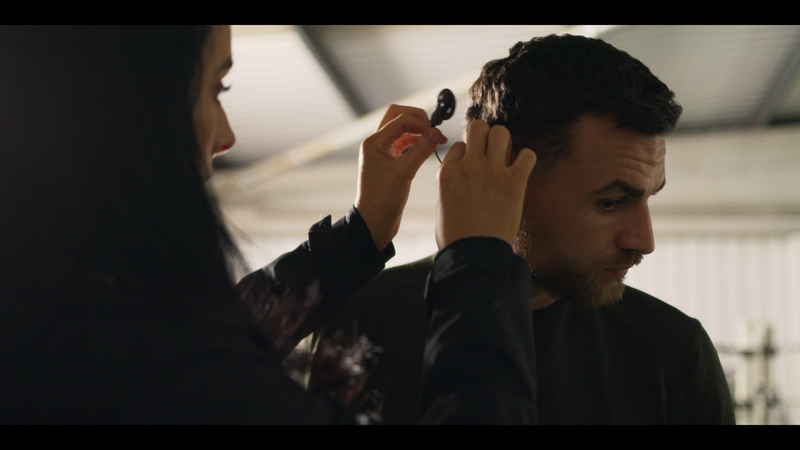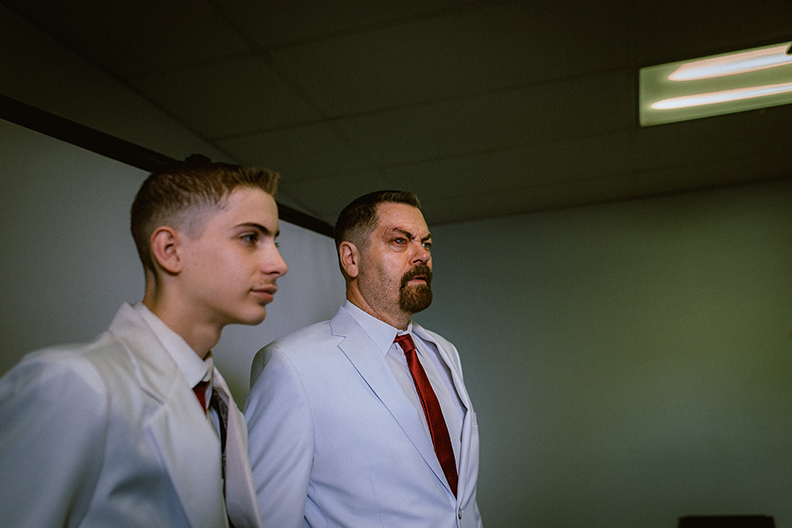
Intimacy Beyond Words
MOVIE REVIEW
A Quiet Love
–
Genre: Documentary
Year Released: 2025
Runtime: 1h 35m
Director: Garry Keane
Where to Watch: shown at the 2025 Doc Edge Film Festival
RAVING REVIEW: What does it mean to love across barriers—barriers of religion, orientation, ability, or communication? That question pulses through the heart of A QUIET LOVE, a quietly profound documentary that gives voice—visually, emotionally, and metaphorically—to three Deaf couples whose stories are as personal as they are universally moving. Directed by Garry Keane, the film is not simply a collection of narratives; it's a rich and immersive experience that transforms the screen into a space of shared empathy, offering viewers a perspective rarely depicted with such authenticity and care.
Despite its relatively simple framework—three stories told through Irish Sign Language—the film carries an unexpected emotional pull. The richness comes not from melodrama but from the deeply human moments that unfold in each vignette. Whether it’s a long-standing romance that survived decades of religious tension, a modern couple navigating the complexities of Deaf parenting, or a Deaf athlete faced with a brutal personal sacrifice, each story stands on its while contributing to a larger mosaic of what love, agency, and identity mean in the Deaf community.
The film’s most remarkable achievement is how it invites the viewer to listen without sound. And no, that’s not just a clever hook. A QUIET LOVE engages its audience in an immersive soundscape designed not just to highlight absence, but to interpret and challenge what we consider essential to communication. At various moments, the sound design pulls back to mirror the sensory world of its subjects, ranging from total silence to partial hearing. This shifting landscape forces the hearing viewer to adapt, recalibrate, and most importantly, pay attention. As the film goes on, the absence of traditional audio begins to feel like an integral presence.
The visuals of the documentary are just as intentional. Keane’s direction lingers on faces, on hands, on the space between two people. That space—whether filled with tenderness, frustration, or unspoken support—becomes its own kind of dialogue. The camera doesn’t rush. This pacing allows nuance to emerge naturally, and in doing so, resists the temptation to oversentimentalize. What emerges is honest and vulnerable storytelling.
In John and Agnes’s chapter, we watch a love that defied a country’s sectarian divide and the well-meaning but damaging efforts of their own families to keep them apart. Their survival of both political unrest and societal issues working against their relationship is a reminder of how often love is politicized—and how language can unify even when ideologies divide. Their segment highlights the Deaf community’s power to bridge gaps that others couldn’t, simply because they shared a language rooted in physical presence and mutual understanding.
Michelle and Kathy’s journey is no less stirring. As an LGBTQIA2S+ couple raising both Deaf and hearing children, their story addresses identity on multiple fronts—gender, ability, and parenthood. One of the most complicated decisions they face revolves around whether to give their Deaf daughter a cochlear implant. Rather than framing the choice as a simple fix, the film dives into its emotional complexity within the Deaf community. Add to that a devastating medical emergency that nearly derails their family entirely, and what unfolds is a portrait of resilience that doesn’t rely on pity but on power.
The third story, centered on Seán, introduces a different kind of tension. A boxer with a troubled past and a promising future, he faces a gut-wrenching choice: undergo surgery to remove his cochlear implant to get the medical clearance required for a professional boxing license, or give up his dream entirely. His partner Deyanna, who is hearing, supports him unconditionally, knowing the decision may sever a part of their shared sensory experience forever. It’s a dilemma that cuts deeper than ambition or career; it speaks to autonomy, identity, and the irreversible decisions many Deaf individuals are forced to make in a world designed for hearing people.
This is Ireland’s first feature in Irish Sign Language, and the care behind the scenes is evident. The film was created by both Deaf and hearing collaborators, with a production environment that prioritized accessibility, mentorship, and community building. Producer Seán Herlihy, who is Deaf himself, notes that these stories are not only personal but also representative of a global Deaf population that is often denied access to media, education, healthcare, and legal resources.
The documentary raises critical awareness about how systemic barriers—not deafness itself—are the true obstacles. As much as this is a film about love, it’s also a critique of a society that continues to exclude, misunderstand, or sanitize Deaf stories. The film challenges viewers—particularly those with hearing impairments—to consider how exclusionary attitudes persist in subtle ways in policy, education, and the media. Ironically, yesterday I posted my review for MARLEE MATLIN: NOT ALONE ANYMORE, a bio-doc about the first Deaf actor to win an Academy Award, and the parallels between these two films are so intriguing.
Ultimately, A QUIET LOVE is a triumph not only of representation but of storytelling. It invites us to slow down, to learn a different level of communication, and to appreciate the profound intimacy that can arise when hands speak in place of voices. It’s a film that urges the industry to make space—not as a favor, but as a long-overdue necessity—and reminds us all that love, in its most unguarded form, is a language we all understand.
Please visit https://linktr.ee/overlyhonestr for more reviews.
You can follow me on Letterboxd, Instagram, Twitter, and YouTube. My social media accounts can also be found on most platforms by searching for 'Overly Honest Reviews'.
I’m always happy to hear from my readers; please don't hesitate to say hello or send me any questions about movies.
[photo courtesy of CURIOUS NORTH PRODUCTIONS]
DISCLAIMER:
At Overly Honest Movie Reviews, we value honesty and transparency. Occasionally, we receive complimentary items for review, including DVDs, Blu-rays, CDs, Vinyl Records, Books, and more. We assure you that these arrangements do not influence our reviews, as we are committed to providing unbiased and sincere evaluations. We aim to help you make informed entertainment choices regardless of our relationship with distributors or producers.
Amazon Affiliate Links:
Additionally, this site contains Amazon affiliate links. If you purchase through these links, we may receive a commission. This affiliate arrangement does not affect our commitment to honest reviews and helps support our site. We appreciate your trust and support in navigating these links.



Average Rating